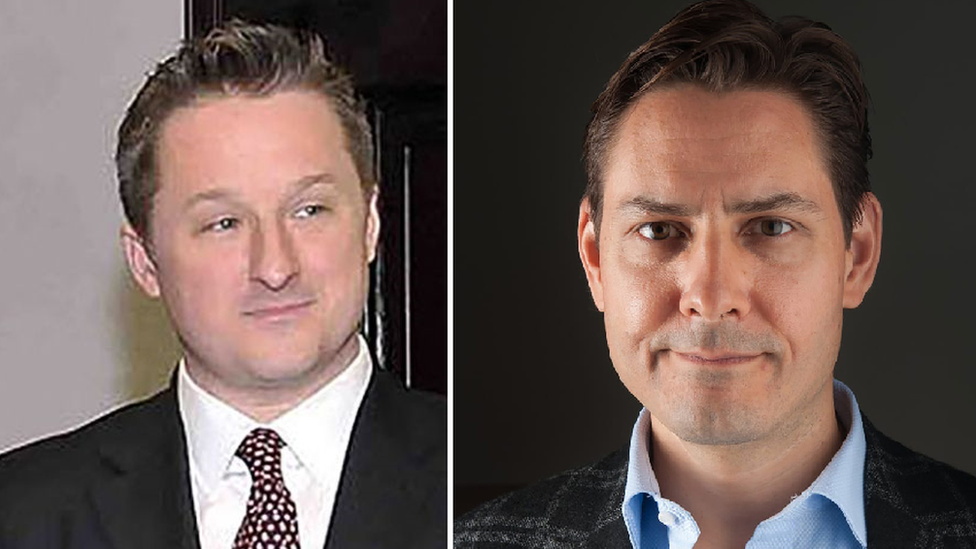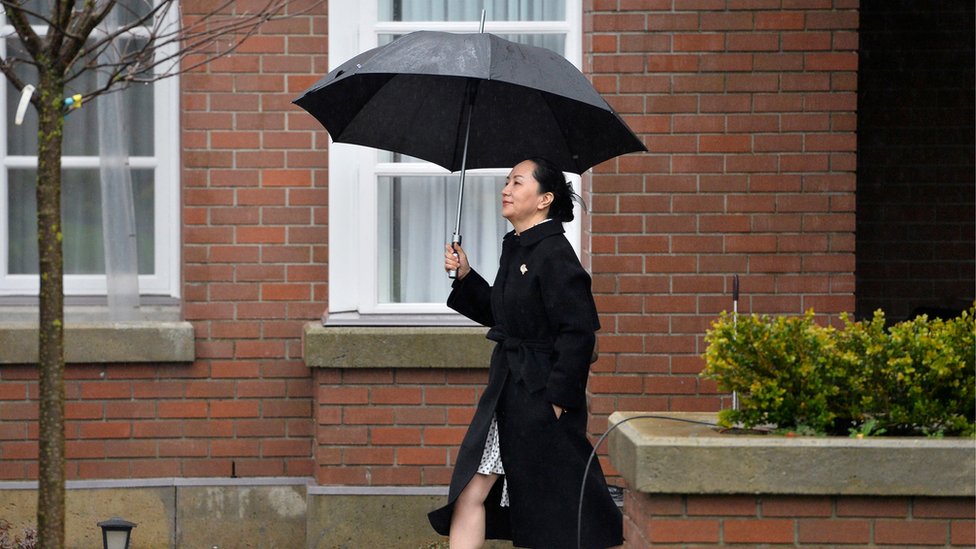Canadians Kovrig and Spavor 'have not been tried' in China

Two Canadians charged with spying in China have not been put on trial, despite earlier reports, Canada's foreign ministry has told the BBC.
China's foreign ministry said earlier that Michael Spavor and Michael Kovrig had been "indicted and tried".
However, Ottawa said it had since spoken to Beijing, and confirmed the pair's case had not yet gone to court.
The confusion was caused by "an inaccurate characterisation" by China's spokeswoman, they added.
There has been no public comment from Beijing on the latest development.
Mr Spavor and Mr Kovrig were arrested two years ago and formally indicted in June.
Their detention came shortly after Canada detained Meng Wanzhou, a senior executive at Chinese tech giant Huawei, following a request by the US.
Ms Meng has been under house arrest in her two Vancouver homes, and is fighting extradition to America. She is charged with lying to American banks about Huawei's alleged dealings with Iran, in violation of US sanctions.
Meanwhile Mr Kovrig - a former diplomat - and businessman Mr Spavor have been held with no access to outside lawyers. They have also had limited opportunities to speak with consular officials or their families.
During a media briefing on Thursday, Chinese foreign ministry spokeswoman Hua Chunying said the two men had been "arrested, indicted and tried". This appeared to be confirmation that the two men had been put on trial - and sparked several media reports.
However, Canadian diplomats in China indicated they had not been able to confirm with court authorities that a trial had taken place - and several hours later, Canada's foreign ministry told the BBC that it had spoken directly with the foreign ministry and confirmed that "there has been no development in the cases of Michael Kovrig and Michael Spavor".
It is not the first time a foreign ministry briefing has sparked confusion. On 1 December, Ms Hua also said that the two men had been "put... on trial" - but again, Chinese courts later confirmed that their trials had not taken place, Canadian sources said.
It is not clear why this confusion appears to have happened twice. A Canadian official told Global News Thursday's confusion sprung from "a comment that was misinterpreted in a translation error".

A reminder that Beijing calls the shots
By Celia Hatton, Asia-Pacific editor, BBC World Service
In Chinese, the words of the Chinese foreign ministry spokesperson, Hua Chunying, were far from clear. But in English, her words appeared unmistakeable: The "Two Michaels", as they're commonly known, had been tried. China's state media then widely repeated the claims in both languages.
But this had already happened. One mistake? That is human. But eyebrows will surely be raised after China's foreign ministry needlessly raised anxieties for a second time. Foreign ministry workers are well educated and the translators there speak flawless English. In my own dealings with Hua Chunying, I've observed that she usually chooses her words very carefully.
So, could Beijing be up to anything? As the Canadians begin their third year in detention, it's been widely reported that US prosecutors are negotiating a plea deal with the lawyers for Chinese Huawei executive Meng Wanzhou. Perhaps the repeated use of murky language will ratchet up the pressure in Ottawa and Washington, pushing all three sides toward a conclusion.
At the very least, it reminds us that Beijing can easily put the two men on trial when desired, leaving Canadian diplomats to scramble for clarification. The Michaels have been charged under murky state secrets laws, so any potential prosecution will be behind closed doors. If they do go before a Chinese court, we've all been given a reminder that the outside world might not get any advance notice.
Another case of cloudy language? Maybe. However, it's painfully clear in these two cases, Beijing calls the shots.

Both Mr Kovrig and Mr Spavor were arrested on 10 December 2018 and interrogated for months before being taken to formal detention facilities. Neither were formally charged until June this year, but could face lengthy prison terms if found guilty.
On Tuesday Ottawa's ambassador to Beijing, Dominic Barton, said both men were in good physical and mental condition, despite their hardship.
Mr Kovrig's employer, Crisis Group, released a statement earlier this week to mark the two-year anniversary of his arrest. The thinktank said it was perplexed by his detention "since it came after a decade of good and productive engagement with the Chinese authorities."

According to Crisis Group, Mr Kovrig had frequently met Chinese officials, spoke at conferences and appeared on Chinese media to comment on regional issues.
Over $28,000 has been raised by a crowdfunding campaign in support of Mr Spavor, who has deep ties with North Korea.
He is a founding member of the Paektu Cultural Exchange, an organisation which facilitates international business and cultural ties with the secretive communist country.
Mr Spavor is only one of a handful of Westerners to have met Kim Jong-un, and helped to arrange a meeting between the North Korean leader and former basketball star Dennis Rodman in 2013.
China has previously denied that their cases are connected to Ms Meng's detention, but it has consistently linked them to its demands that she be released.
No comments:
Post a Comment